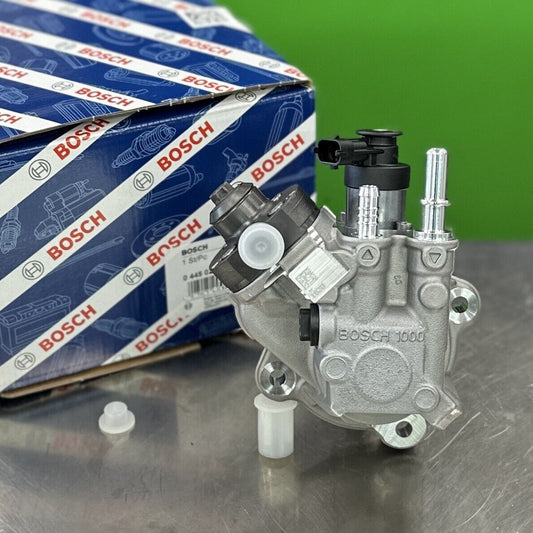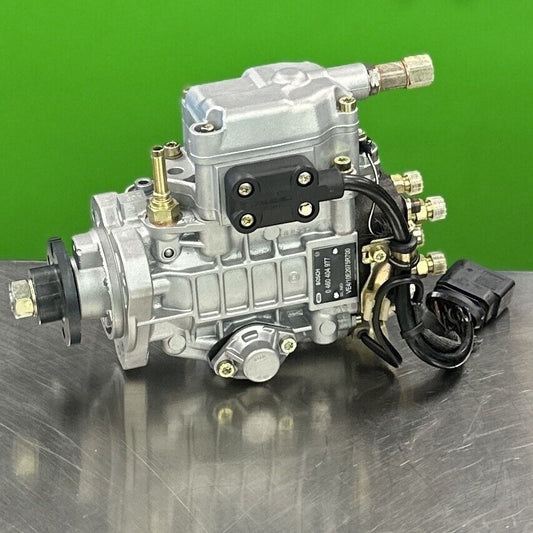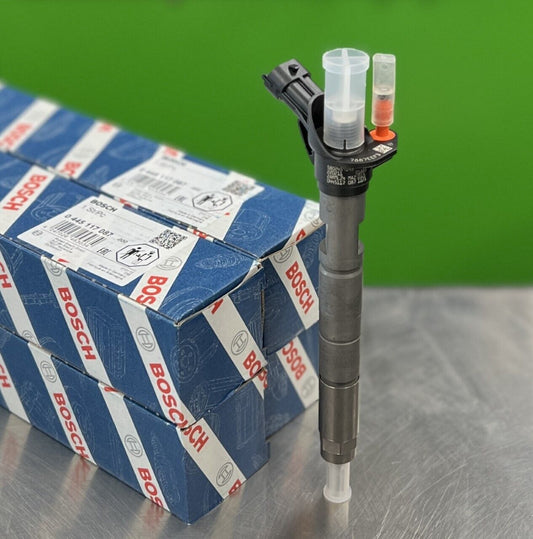Fuel Injector Replacement: When Is It Necessary?
When it comes to ensuring your vehicle's optimal performance and efficiency, the fuel injector plays a crucial role. But how do you know when it's time to consider a fuel injector replacement? Let's delve into the signs and reasons that indicate the necessity of addressing this component to keep your engine running smoothly.
One of the primary indicators of a faulty fuel injector is engine misfires. These sudden jerks or hesitations while driving can be a red flag that something is amiss with the fuel delivery system. Additionally, if you notice rough idling, decreased fuel efficiency, or strange smells emanating from your vehicle, it might be time to investigate the health of your fuel injector.
Several factors can contribute to fuel injector failure, with one of the most common being clogging caused by dirt or debris. Over time, these particles can build up and obstruct the injector's nozzle, disrupting the fuel spray pattern. Electrical issues, poor fuel quality, and general wear and tear are also culprits that can lead to the malfunction of fuel injectors.
Addressing fuel injector issues promptly is crucial to prevent further damage to your engine. By replacing a faulty injector in a timely manner, you not only improve fuel economy but also maintain the overall performance of your vehicle. Ignoring these signs can result in more significant and costly repairs down the road.
When faced with the decision of replacing a fuel injector, you may consider whether to enlist the help of a professional mechanic or attempt a DIY replacement. While the DIY route may seem cost-effective, it comes with risks and challenges that could compromise safety and efficiency. Professional mechanics have the expertise and tools to ensure a proper replacement, giving you peace of mind.
Signs of a Faulty Fuel Injector
When it comes to the signs of a faulty fuel injector, your vehicle may be trying to tell you something important. Imagine your car as a skilled detective, dropping subtle hints that something is amiss under the hood. One of the most common clues is engine misfires, where your car's engine stutters and struggles to maintain a smooth performance. It's like a musician hitting the wrong notes during a concert, disrupting the harmony of the entire orchestra.
Another red flag to watch out for is rough idling. Picture your car as a restless sleeper, unable to find a comfortable position. If your vehicle shakes and shudders while at a standstill, it could be a sign that the fuel injector is not delivering fuel evenly to the engine cylinders. This can lead to a bumpy ride and potential long-term damage if left unaddressed.
Decreased fuel efficiency is another indicator of a potential fuel injector issue. Just like a leaky faucet wasting precious water, a faulty fuel injector can cause your vehicle to guzzle more fuel than usual. If you find yourself making more frequent stops at the gas station without a reasonable explanation, it might be time to investigate the health of your fuel injector.
Unusual smells emanating from your vehicle can also point to a malfunctioning fuel injector. Imagine your car as a chef in the kitchen, emitting strange odors that are far from appetizing. If you detect a strong smell of gasoline or notice black smoke coming from the exhaust, it could indicate that the fuel injector is not operating correctly. Addressing these warning signs promptly can help prevent further damage and keep your vehicle running smoothly on the road.
Reasons for Fuel Injector Failure
When it comes to the reasons behind fuel injector failure in vehicles, several factors can contribute to this crucial component malfunctioning. One of the primary causes is the accumulation of dirt and debris within the fuel injector, leading to clogging and hindering the proper flow of fuel into the engine. This can result in inefficient combustion, affecting the overall performance of the vehicle.
Electrical issues also play a significant role in fuel injector failure. Problems such as faulty wiring, damaged connectors, or issues with the engine control module can disrupt the communication between the fuel injector and the engine, causing irregular fuel delivery and impacting engine operation.
Poor fuel quality is another critical factor that can lead to fuel injector failure. Contaminated or low-quality fuel can contain impurities that clog the injector nozzles, affecting the spray pattern and fuel atomization. This not only reduces engine efficiency but can also cause long-term damage to the fuel injection system.
Furthermore, wear and tear over time can also contribute to the deterioration of fuel injectors. Continuous use and exposure to high temperatures can cause the internal components of the injector to degrade, leading to leaks, inconsistent fuel delivery, and ultimately, engine performance issues.
In summary, the reasons for fuel injector failure are multifaceted, ranging from clogging due to dirt and debris, electrical malfunctions, poor fuel quality, to the natural wear and tear experienced by these components over time. Understanding these factors is crucial in identifying potential issues early on and taking the necessary steps to address them to ensure optimal engine performance and efficiency.
Importance of Timely Replacement
When it comes to the of fuel injectors in a vehicle, it's crucial to understand the impact it can have on the overall performance and longevity of your engine. Ignoring signs of a faulty fuel injector can lead to a domino effect of issues that may result in costly repairs down the road. Just like changing the oil in your car regularly to keep the engine running smoothly, replacing a worn-out fuel injector is key to maintaining optimal fuel efficiency and performance.
Imagine your fuel injector as a tiny but mighty worker in your engine, responsible for precisely delivering the right amount of fuel to the combustion chamber. Over time, these hard-working components can get clogged with dirt, debris, or residue from poor-quality fuel. This buildup can disrupt the injector's spray pattern, affecting the air-fuel mixture and ultimately impacting your vehicle's performance. Addressing these issues promptly through timely replacement can prevent further damage and ensure your engine runs like a well-oiled machine.
One of the most compelling reasons to prioritize the timely replacement of fuel injectors is the potential cost savings in the long run. A malfunctioning fuel injector can lead to decreased fuel economy, meaning you'll find yourself making more frequent trips to the gas station and spending more money on fuel. By replacing a faulty injector promptly, you can improve your vehicle's efficiency and save money on gas expenses over time.
Moreover, a timely replacement can also contribute to the overall health and performance of your engine. Fuel injectors play a critical role in the combustion process, and any issues with their function can impact engine power, acceleration, and smooth operation. By addressing fuel injector problems promptly, you can avoid more extensive damage to your engine and ensure that your vehicle continues to run at its best.
When considering the , it's essential to weigh the benefits of proactive maintenance against the risks of neglecting this crucial task. Investing in regular inspections and replacements can help you avoid unexpected breakdowns, costly repairs, and potential safety hazards on the road. By staying ahead of fuel injector issues and addressing them promptly, you can enjoy a smoother driving experience and peace of mind knowing that your vehicle is performing at its peak.
Professional vs. DIY Replacement
When it comes to replacing fuel injectors in your vehicle, one crucial decision you'll face is whether to opt for a professional mechanic or attempt a DIY replacement. Let's dive into the pros and cons of each approach to help you make an informed choice.
Professional Replacement:
Turning to a professional mechanic for fuel injector replacement comes with a range of benefits. These experts have the necessary skills, experience, and tools to efficiently handle the task, ensuring precision and quality work. By entrusting the job to a professional, you can have peace of mind knowing that the replacement will be done correctly, minimizing the risk of errors or complications.
Moreover, professional mechanics often provide warranties for their services, offering you added protection and assurance. They can also conduct thorough diagnostics to identify any underlying issues that may be contributing to the fuel injector problem, allowing for a comprehensive solution.
On the flip side, opting for professional replacement may entail higher costs compared to a DIY approach. However, the expertise and reliability that come with professional service can outweigh the upfront expenses, especially when it comes to the critical components of your vehicle like fuel injectors.
DIY Replacement:
Embarking on a DIY fuel injector replacement project can be a tempting option for those inclined towards hands-on work and cost-saving measures. With the abundance of online resources and tutorials available, some car owners may feel confident in taking on the task themselves.
While a successful DIY replacement can lead to a sense of accomplishment and potential cost savings, it's essential to consider the risks involved. Inaccurate installation or improper handling of fuel injectors can result in further damage to the engine, compromising performance and safety.
Additionally, DIY replacement may lack the thoroughness and expertise that a professional mechanic can provide. Without proper diagnostics and knowledge of potential underlying issues, there's a higher chance of overlooking critical details that could impact the effectiveness of the replacement.
In conclusion, the choice between professional and DIY fuel injector replacement ultimately depends on your comfort level, expertise, and budget. While a DIY approach may appeal to some, seeking professional assistance can offer peace of mind, quality assurance, and long-term benefits for your vehicle's performance and longevity.
```htmlFrequently Asked Questions
-
1. When should I consider replacing my fuel injectors?
If you notice symptoms like engine misfires, rough idling, decreased fuel efficiency, or unusual smells, it may be time to replace your fuel injectors. It's essential to address these signs promptly to prevent further damage to your vehicle.
-
2. What are the common reasons for fuel injector failure?
Fuel injector failure can be caused by factors such as clogging due to dirt or debris, electrical issues, poor fuel quality, or simply wear and tear over time. Regular maintenance and using quality fuel can help prevent these issues.
-
3. Is it better to have a professional replace my fuel injectors?
While DIY replacement is possible, it's highly recommended to have a professional mechanic handle fuel injector replacement. Professionals have the expertise and tools to ensure the job is done correctly, maintaining safety and efficiency.
-
4. How can timely fuel injector replacement benefit my vehicle?
Timely replacement of fuel injectors can help improve engine performance, fuel economy, and overall vehicle efficiency. Ignoring fuel injector issues can lead to more significant problems down the line.



